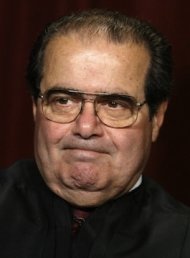 Justice Antonin Scalia (Mark Wilson/Getty Images)Civil rights leaders are up in arms over Supreme Court Justice Antonin Scalia's skeptical questions about a key portion of the Voting Rights Act, a cornerstone of the civil rights movement that brought an end to Jim Crow-era racial discrimination at the polls in the South.
Justice Antonin Scalia (Mark Wilson/Getty Images)Civil rights leaders are up in arms over Supreme Court Justice Antonin Scalia's skeptical questions about a key portion of the Voting Rights Act, a cornerstone of the civil rights movement that brought an end to Jim Crow-era racial discrimination at the polls in the South.
In oral arguments over the law on Wednesday, Scalia, a stalwart of the court's conservative wing, suggested that the Voting Rights Act was overwhelmingly reauthorized in 2006 by Congress because the nation's politicians were afraid to oppose a "racial entitlement."
Scalia said that each time the Voting Rights Act has been reauthorized in the past 50 years, more and more senators supported it, even though the problem of racial discrimination at the polls has decreased over that time. "Now, I don't think that's attributable to the fact that it is so much clearer now that we need this," he said. "I think it is attributable, very likely attributable, to a phenomenon that is called perpetuation of racial entitlement. It's been written about. Whenever a society adopts racial entitlements, it is very difficult to get out of them through the normal political processes."
The Supreme Court was hearing arguments from Shelby County, Ala., that the nine states and assorted counties covered under the 1965 law no longer need special federal oversight to prevent them from discriminating against black voters.
Rep. John Lewis, D-Ga., a major figure in the civil rights movement who was a former chairman of the Student Nonviolent Coordinating Committee, said on MSNBC that he was appalled by the comment. ?It is an affront to all of what the civil rights movement stood for, what people died for, what people bled for, and those of us who marched across that bridge 48 years ago, we didn?t march for some racial entitlement,? he said. ?We wanted to open up the political process and let all of the people come in, and it didn?t matter whether they were black or white, Latino, Asian-American or Native American.?
NAACP President Ben Jealous told ABC News, "The protection of the right to vote is an American entitlement. It is a democratic entitlement. And those who would seek to use incendiary rhetoric from the bench of the Supreme Court should think twice about their place in history."
The Rev. Al Sharpton and Jesse Jackson also criticized his remark.
Later on Wednesday, Justice Sonia Sotomayor appeared to indirectly reprimand Scalia for the comment, asking Shelby County's attorney Bert Rein whether he believes the right to vote protected under the act is a racial entitlement. Rein answered, "No."
Spencer Overton, a law professor at George Washington University and a fellow at the liberal think tank Demos, told Yahoo News that Scalia's comment represented a "political assumption that has no place in a court of law. His assumption raises questions about his ability to approach this case in an impartial manner, and it also suggests that the question of the persistence of voting discrimination is best left to Congress," Overton wrote in an email.
Justices often make controversial comments or ask provocative questions during oral arguments, and it's very difficult to predict a case's outcome simply by listening to the justices question the attorneys. But most court-watchers emerged from the oral arguments believing the portion of the Voting Rights Act that singles out states and counties with a history of racial discrimination at the polls?most of them in the South?will be struck down. Discriminating against minority voters would still be illegal under the act, but people who hope to challenge discriminatory actions would have to do so through the regular court process, which takes longer than the special pathway set up under the law.
jennifer love hewitt secret service prostitution 4 20 george zimmerman sheree whitfield weather dallas pat summitt
No comments:
Post a Comment